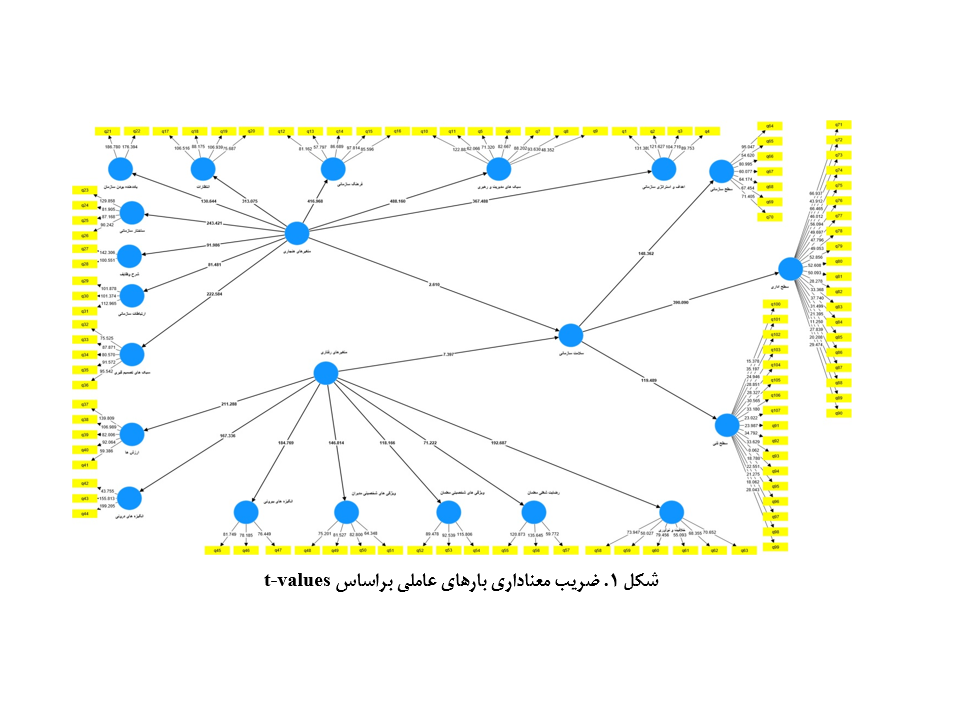اعتبارسنجی الگوی سلامت سازمانی در مدارس ابتدائی استان بابل عراق
کلمات کلیدی:
سلامت سازمانی, اهداف و استراتژی سازمانی, فرهنگ سازمانی, رضایت شغل, خلاقبت و نوآوریچکیده
این پژوهش با هدف اعتبارسنجی الگوی سلامت سازمانی در مدارس ابتدائی استان بابل عراق انجام شد. این پژوهش از نظر شیوه گردآوری دادهها کمی- توصیفی و از نظر هدف کاربردی است. جامعه آماری شامل کلیه مدیران مدارس ابتدائی استان بابل عراق بوده است. بر این اساس، حجم نمونه 380 نفر بوده است. حجم نمونه در این بخش براساس جدول مورگان – گرجسی تعیین شده است. روش نمونهگیری نیز روش تصادفی بوده است. برای گردآوری داده¬ها در این پژوهش از پرسشنامه استاندارد سلامت سازمانی توسط هوی و فیلدمن (1996) و پرسشنامه محققساخته استفاده شده است. برای محاسبه پایایی از آلفای کرونباخ استفاده گردید که مقدار آن 90/0 حاصل شد. جهت تحلیل دادهها از روش معادلات ساختاری به کمک نرمافزار آموس و پی ال اس استفاده شده است. نتایج نشان داد متغیرهای هنجاری با ضریب مسیر 240/0 تقریباً به میزان 24/0 بر سلامت سازمانی مدارس ابتدائی استان بابل عراق اثرگذار است، و این اثرگذاری به صورت مستقیم و مثبت ارزیابی شده است. بدین معنا که هرچقدر متغیرهای هنجاری در سطح بالاتری قرار بگیرند سلامت سازمانی مدارس ابتدائی استان بابل عراق نیز بالاتر میرود و بالعکس. متغیرهای رفتاری نیز با ضریب مسیر 650/0 تقریباً به میزان 65/0 اثر مثبت و مستقیمی بر سلامت سازمانی مدارس ابتدائی استان بابل عراق دارد، بدین معنا که هرچه متغیرهای رفتاری در سطح بالاتری قرار بگیرند سلامت سازمانی افزایش مییابد.
دانلودها
مراجع
Hawkins GT, Chung CS, Hertz MF, Antolin N. The school environment and physical and social‐emotional well‐being:
implications for students and school employees. Journal of School Health. 2023;93(9):799-812. doi: 10.1111/josh.13375.
Widarko A, Anwarodin MK. Work motivation and organizational culture on work performance: Organizational
citizenship behavior (OCB) as mediating variable. Golden Ratio of Human Resource Management. 2022;2(2):123-38. doi:
52970/grhrm.v2i2.207.
Darling-Hammond L, DePaoli J. Why school climate matters and what can be done to improve it. State Education
Standard. 2020;20(2):7.
Storey KE, Montemurro G, Flynn J, Schwartz M, Wright E, Osler J, et al. Essential conditions for the implementation
of comprehensive school health to achieve changes in school culture and improvements in health behaviours of students. BMC
Public Health. 2016;16:1-11. doi: 10.1186/s12889-016-3787-1.
Capone V, Joshanloo M, Park MSA. Burnout, depression, efficacy beliefs, and work-related variables among school
teachers. International Journal of Educational Research. 2019;95:97-108. doi: 10.1016/j.ijer.2019.02.001.
Fu C, Ouyang M, Liu X, Xu G, Wang H, Ye Z, et al. The role of school organizational conditions in teacher
psychological resilience and stress during COVID-19 pandemic: A moderated mediation model. Frontiers in Psychology.
;13:1047831. doi: 10.3389/fpsyg.2022.1047831.
Sadat Mousavi S, Ebrahimi A. Structural Model of the Effect of Psychological Capital on Innovative Behavior in
Teaching: The Mediating Role of Conscientiousness Personality Trait. International Journal of Education and Cognitive
Sciences. 2024;4(4):1-10. doi: 10.61838/kman.ijecs.4.4.1.
Zweeris K, Tigelaar EH, Janssen FJJM. Studying curriculum orientations in teachers' everyday practices: A goal
systems approach. Teaching and Teacher Education. 2023;122:103969. doi: 10.1016/j.tate.2022.103969.
Altıntaş M, Özata M. Researching the relationship between organizational health and whistleblowing behavior:
education and health organizations version. Journal of International Health Sciences and Management. 2020;6(10):12-34. doi:
48121/jihsam.788565.
Ardıç K, Polatcı S. An integrated view of employee welfare and organizational effectiveness: Organizational health.
İktisadi ve İdari Bilimler Dergisi. 2007;21(1):139.
Özgenel M, Aksu T. The power of school principals' ethical leadership behavior to predict organizational health.
International Journal of Evaluation and Research in Education. 2020. doi: 10.11591/ijere.v9i4.20658.
Crosby M. Examining the relationship between organizational health and faculty satisfaction in institutions of higher
education: Indiana State University; 2022.
Panchal N, Cox C, Rudowitz R. The landscape of school-based mental health services. Menlo Park, CA: Kaiser Family
Foundation; 2022.
Jalilpour M, editor Examining the Relationship Between Organizational Health and the Happiness of Teachers in
Mahabad County Schools. International Conference on Interdisciplinary Studies in Management and Engineering; 2022.
Alipour F, Rahimi M, Asabat Tabari E. Factors Affecting School Organizational Health: The Role of Leadership and
Organizational Trust. Educational and School Studies. 2022;11(4):31-56.
Salmabadi A, Hamel Oa-B, Ahmadi S, Daneshfar M. The Role of Psychological Capital in Organizational Health
With the Mediation of Organizational Virtue. Islamic Studies in Health. 2022;6(3):27-38.
Hejazi A, Farajollahi Moghadam H, Karimi M. Predicting School Organizational Health Through Transformational
Leadership and Entrepreneurial Spirit. Theory and Practice in Teacher Education (New Strategies in Teacher Education).
;8(13):149-72.
Alizadeh B, Nasti Zaie N. Examining the Relationship Between Organizational Health and Organizational Virtue
With the Mediation of Organizational Justice. Bioethics Journal. 2019;9(32):33-45.
Dehghani S, Mohammadi R. Examining the Relationship Between Teachers' Academic Optimism, Organizational
Health, and School Effectiveness in Elementary Board and Regular Schools. Research in Elementary Science Education.
;1(2):43-56.
Velarde JM, Ghani MF, Adams D, Cheah JH. Towards a healthy school climate: The mediating effect of
transformational leadership on cultural intelligence and organisational health. Educational Management Administration &
Leadership. 2022;50(1):163-84. doi: 10.1177/1741143220937311.
Kirchhoff S, Dadaczynski K, Pelikan JM, Zelinka-Roitner I, Dietscher C, Bittlingmayer UH, et al. Organizational
health literacy in schools: concept development for health-literate schools. International Journal of Environmental Research
and Public Health. 2022;19(14):8795. doi: 10.3390/ijerph19148795.

دانلود
چاپ شده
ارسال
بازنگری
پذیرش
شماره
نوع مقاله
مجوز
حق نشر 1403 نشریه پژوهش و نوآوری در تربیت و توسعه

این پروژه تحت مجوز بین المللی Creative Commons Attribution-NonCommercial 4.0 می باشد.










